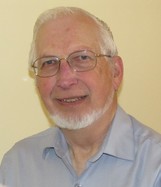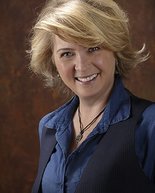|
Meet Roy Blomstrom ...  How long have you been a member of NOWW? I’ve been a member for about fifteen years. What do you normally write? I try to write in all genres – everything from standard prose and poetry to experimental forms, to theatrical modes, to song. Do you have a favourite book or favourite author? No favourite author. Favourites always get in my way when I want to write. They’re like Facebook and Twitter. Let’s get to know you a bit better. Tell us a bit about yourself and how you found your way to writing: I began writing seriously in grade three when I wrote a story about Peter Parrot who flew through a window of the Empire State Building. In grades six through seven I was the class reader – the kid who read novels to the other students for half an hour each Friday so that the teacher could get her grading done. Ideas don’t really come to me; I have to go get them, but that’s more than half the fun. Words of wisdom: ask yourself who your reader is, what’s new about the story you’re telling, and when you’ve finished a piece . . . recognize that you’ve not. Tell us a bit about your writing and your writing style. I don’t do one thing at a time. The major emphasis this month has been the editing of a novel, proofing and improving a ten-minute play, assembling poetry for a possible submission, and thinking about new places to send stuff out. I’m constantly googling and doing research on things that interest me (Oh, look! Something shiny!) Who has inspired and impacted your writing? I don’t get inspired. I do get competitive. Favourite book? Right now it’s the Swedish/English dictionary, but after I blink, it’ll be something else. I also don’t have favourite writers. Before I start to write, though, I find myself always wondering what people like to read about. Can we see you at any upcoming NOWW events? I’ll be at some of the events. Not sure which. Where can we learn more about you and your writing? I do have a website, but it’s out of date and goofy. It was set up to test out a new way of handling high school English education. The best way to find out about me is to say hello. And to end things off, tell us something surprising about yourself! I play recorder, banjo, and violin – all of them badly (not so surprising to those who have heard me play) – and I sing.
0 Comments
by Ryan Mackett  I’ve been asked, “Why do you get to write about movies in the newspaper?” It’s a fair question, to be honest. Truthfully, I was perseverant in convincing The Chronicle Journal that they needed a local perspective on new release movies, as opposed to (or at least in addition to) the professional reviews they publish. I’d regularly post long, rambling rants about movies on Facebook; friends commented that they enjoyed reading my reviews. My cousin Mark convinced me to try and pursue writing about movies for the newspaper, so I took his advice. I emailed back and forth with the CJ for a while, providing samples of my writing. After hearing nothing for a while, I randomly got an email from them in October 2010 asking for a review of a recent film, ASAP! They were impressed with my writing abilities and offered me the opportunity to contribute a weekly movie review, which I have been providing to them ever since. I understand, however, that when people ask me why I get to write about movies for the paper, they aren't asking me how I got the gig. They’re really asking me why I get to. “So you like movies, big deal! I like food! Maybe I should write for the paper about food! What makes you so special that you get to write about movies?” OK, fair enough. I don't consider myself a “Film Critic”. That’s a title reserved for Richard Crouse, Leonard Maltin, and the late Roger Ebert. I’m a “movie reviewer”. A critic, as defined by the Oxford English Dictionary, is “a person who judges the merits of literary or artistic works, especially one who does so professionally.” I suppose by definition I do exactly that, but I consider myself a film enthusiast, not a film historian. I’m not approaching my reviews with the intent of academic criticism. I’m not a film scholar. I may touch on various aspects of film theory or the technicalities of filmmaking, but I’m primarily informed through my enthusiasm for and self-taught knowledge of film. I review movies not to have my little articles join the annals of film criticism history, but to try and inform average movie-goers about what’s new, what they might like, and what they may want to stay away from, from the perspective of an average filmgoer. I do bring something to the table beyond what the average movie-goer does, though: my ability to write about art and my ability to separate subjectivity and objectivity. These two skills come from four years of studying art, art theory, art criticism and writing about art. Admittedly, the 400 words I’m allotted for my articles is not nearly enough to truly present a formal critical analysis of a film similar to how I’d have written about art during my studies, but the basics are still there. A fair portion of the movie-going public primarily cares about actors, story, connections to a franchise they enjoy and maybe the director. The general movie-going public also appreciates things like awesome special effects and beautiful cinematography. I see it as my job to present this type of information, along with interesting tidbits about a film and how it was made, in addition to my own informed opinion, all while juggling a word limit that I often exceed. Opinion is the most subjective part of a review. My tastes may differ greatly from yours, but I always try and base my opinion from an informed place. A pet peeve of mine is when someone proclaims “that sucks.” You may prefer one thing more than something else; that is an opinion. It gets tricky when subjectivity and objectivity begin to dance together, though. For example, a guilty pleasure of mine (the Transformers franchise) objectively “sucks.” I could back that up as a statement of fact by pointing out shoddy directing, poor dialogue, bloated plots and many cringe-worthy aspects of the films. However, I enjoy them. They’re fun to watch. Cool effects, action, and favourite characters from my childhood bring back a sense of nostalgia that makes me happy. One of the things I try to do when reviewing a film is to know what type of movie I’m reviewing. There is no single linear list of movies ranging from best to worst. I personally have two lists: my FAVOURITE movies of all time and what I think are the BEST movies of all time. Some titles appear on both lists, but for the most part they’re comprised of different titles. The trick, from a reviewer’s perspective, is to write a review that discusses the film from the context in which it was created. I’d never approach a review of Moonlight the same way that I would Transformers. Filmmaking is an art form, but films are created for different reasons (much like how other art forms are used to create art for different reasons). Sometimes a film is a “movie”: big-budget products meant to appeal to the masses and make the most money. Sometimes a film is a work of art: challenging and not as accessible by people who aren't interested in those types of movies. I respect both types of films. It’s so easy to dismiss movies that are created as entertainments because they lack the artistic merit or integrity of films being created to function solely as art. It’s exciting when films come along that function as both, films that have mass appeal, exude artistry and challenge viewers, while receiving both critical and box office success. There’s more to discuss, but I’ll end here with some advice: open yourself up to new film-going experiences! If you scoff at comic book movies, give one a try! If you only ever watch bubblegum popcorn flicks, try a movie you've never heard of! You’ll be surprised at what you might discover. Yes there’s tons of crap out there, but it’s so exciting to find really great films hidden amongst the dung. Ryan Mackett was born, raised, and lives in Thunder Bay. He is an artist, photographer, writer, film enthusiast, and former teacher. Ryan graduated from Lakehead University with an Honours Bachelor of Fine Arts focusing on sculpture and printmaking; he also holds a Bachelor of Education.
When not carrying out creative pursuits, Ryan is the Community Stewardship/Public Relations Officer with the Lakehead Region Conservation Authority, a position he has held since 2011 which allows him to exercise all of his creative muscles. Ryan is a weekly contributor to The Chronicle Journal and he writes for the blog Channel 807. Follow him on Facebook @tbaymovieguy and email him at [email protected].  How long have you been a member of NOWW? I joined NOWW about 3 years ago. What do you normally write? I’m a speculative fiction writer. That includes science fiction, fantasy, steampunk, sword and sorcery, etc. Anything that involves a great deal of imagination! Do you have a favourite book or favourite author? Oh, that’s easy. Canadian speculative fiction author Guy Gavriel Kay is my favourite author, and his novel, Lions of al Rassan is my favourite novel of all time. Let’s get to know you a bit better. Tell us a bit about yourself: I grew up here in Thunder Bay as a quiet, shy, nerdy kid who would rather spend time with books and animals than with people. I studied Zoology at the University of Guelph and worked in the Edinburgh Zoological Gardens in Scotland with lions, tigers and bears (oh my.) I have three dogs, three cats, three kids, one horse and one husband, and while I am still nerdy, I’m not nearly so shy or quiet anymore. And while I still enjoy spending time with animals, now the friends I do prefer are all Foxes! Tell us a bit about your writing: I have been writing since I was in kindergarten and actually finished my first novel at the age of 11. I’m also an artist and I pencilled my way through university with the help of DC Comics. While I have had a New York agent and a book contract, I prefer the life of an indie author. I think it must be the freedom and self-control that I find in that field and if you look for it, you will find freedom is a recurring theme in my work. Whether it’s freedom from prejudice or freedom from societal rules, or simply freedom to be oneself, I think all of my characters are searching for freedom in some form or another. What are your favourite things or some of your inspirations? I love classical music, and I’ll often find myself turning to music when I’m stuck writing a scene, or missing a crucial character point. I also read the works of Jules Verne, H.G. Wells, Arthur Conan Doyle, etc. when I was quite young, and I think their influence is evident in my work. For me, it is always about the ‘what if’, so I find inspiration in almost everything, as long as I can take it and turn it on its head. ‘What if insanity was simply seeing into other dimensions?’ or ‘What if scientists spliced the DNA of humans with that of big cats?’ or ‘What if Black Beauty was a War Dragon?’ That kind of thing. Can we see you at any upcoming NOWW events? My friend Jean E. Pendziwol and I will be running a NOWW workshop on April 29 called “The Business of Writing” and we’ll also be taking that same workshop to Dryden in May. I do love the Write NOWW events – informal, social yet informative at the same time. How can others learn more about you? I’ve written seven books to date and I’m working hard now on the eighth. The books are available at Chapters/Coles and on Amazon. I do have a fun website – www.hleightondickson.com, am very active on Facebook at www.facebook.com/HLeightonDickson and I do tweet, but I don’t understand why.; @hdickson62. I’m not a terribly prolific blogger. I prefer to write epic novels with fantastical word counts. And to end things off, tell us something surprising about yourself! I have been chased by a lion. True story. "The Business of Writing " - Workshop ReviewBy: Sheriden Barnett “We are all apprentices in a craft where no one ever becomes a master.” —Ernest Hemingway As a re-emerging writer with a day job, I have never considered writing as an industry. Writing has always been for me a necessary form of self-expression, an exploration of self and other, a way of understanding and placing myself in the world. I had signed up for the Northern Ontario Writers Workshop event entitled, the “Business of Writing” more out of curiosity than a burning intention to earn a living from or even to publish the products of my imagination (read: in-progress). As I battled my way through the remnants of Friday’s snow storm toward the Mary J. Black library, I second guessed my reasons for attending the event. But upon arrival, I quickly found a welcoming group of self-proclaimed introverts, who I later learned meet writer-type crises with supportive conversation over glasses of wine and hot-tubbing. Suffice it to say, I felt I had found my place in the world! Quite beyond the quiet satisfaction of finding myself among a group of peers with a common interest in writing (and maybe more importantly, reading), the workshop itself was a welcome surprise. It was facilitated by two local authors – Jean E. Pendziwol and H. Leighton Dickson – one a renowned children’s author turned “upmarket” novelist, the other a former zoologist turned fantasy writer, and each with a distinct journey to becoming published authors. The title, “The Business of Writing” could be construed as a controversial one. After all, isn’t writing an act of pure creativity, an art form born of the desire or necessity to communicate? To quote Virginia Woolf, “Every secret of a writer’s soul, every experience of his life, every quality of his mind, is written large in his works”. Does that sound like a business to you? The Business of Writing Workshop is being offered again on April 29th in Thunder Bay and in Dryden on May 27th. Details can be found on our website under Events. www.nowwwriters.ca/workshops.html But seen from the perspective of our facilitators, while the act of writing is indeed an “art”, the business of writing is also a “science” with a distinct process that we too could follow. Achieving that balance (think yin and yang) will dramatically increase a writer’s chances of becoming a published author in whatever genre he or she chooses. As a professional mediator, I have a strong proclivity for process. The facilitators’ concrete, analytical, and well researched approach—laid out in the workshop in power point slides and accompanied by engaging tales of their personal journeys--appealed to me greatly.
In its essence, this workshop answers the question, “How does a writer actually get published?” The facilitators took us through an extremely detailed plan to do just that. They provided advice and information on identifying your genre and placing yourself within the marketplace, creating a writing community, the importance of word count, the multiple phases of editing a piece for publication, finding an agent (who knew twitter has a real-world function?!) or choosing the self-publishing route, and negotiating a publishing contract. Whether you are a writer with a finished product or a burgeoning writer with a novel that must be written (like me); whether your interest is fiction, non-fiction, romance or literary, the “Business of Writing” is an essential guide. Now all I need to do is write! Sheridan Barnett Sheriden Barnett (LLM, ADR) is the President of the Boreal Centre for Dispute Resolution, a boutique firm specializing in the resolution of complex, multi-party conflicts, human rights and Indigenous rights disputes. She is currently writing her first novel entitled, “Ar Muir: At Sea." |
NOWW Writers
Welcome to our NOWW Blog, made up of a collection of stories, reviews and articles written by our NOWW Members. |
Proudly powered by Weebly

 RSS Feed
RSS Feed